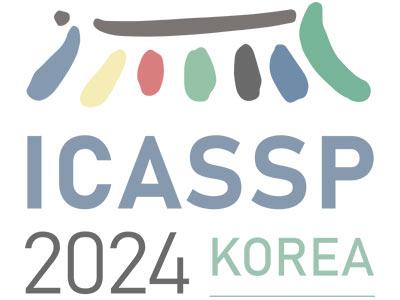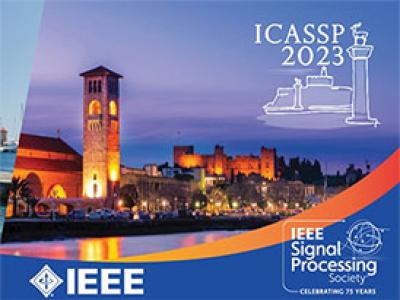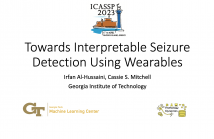- Bayesian learning; Bayesian signal processing (MLR-BAYL)
- Bounds on performance (MLR-PERF)
- Applications in Systems Biology (MLR-SYSB)
- Applications in Music and Audio Processing (MLR-MUSI)
- Applications in Data Fusion (MLR-FUSI)
- Cognitive information processing (MLR-COGP)
- Distributed and Cooperative Learning (MLR-DIST)
- Learning theory and algorithms (MLR-LEAR)
- Neural network learning (MLR-NNLR)
- Information-theoretic learning (MLR-INFO)
- Independent component analysis (MLR-ICAN)
- Graphical and kernel methods (MLR-GRKN)
- Other applications of machine learning (MLR-APPL)
- Pattern recognition and classification (MLR-PATT)
- Source separation (MLR-SSEP)
- Sequential learning; sequential decision methods (MLR-SLER)

- Read more about Prompting Label Efficiency in Federated Graph Learning via Personalized Semi-supervision
- Log in to post comments
Federated graph learning (FGL) enables the collaborative training of graph neural networks (GNNs) in a distributed manner. A critical challenge in FGL is label deficiency, which becomes more intricate due to non-IID decentralized data. Existing methods have focused on extracting knowledge from abundant unlabeled data, leaving few-shot labeled data unexplored. To this end, we propose ConFGL, a novel FGL framework to enhance label efficiency in federated learning with non-IID subgraphs.
- Categories:
 13 Views
13 Views
- Read more about UNRAVELING EXPLAINABLE REINFORCEMENT LEARNING USING BEHAVIOR TREE STRUCTURES
- Log in to post comments
The black-box characteristic of deep reinforcement learning restricts the safe and scalable application of decision models in practical deployment. Existing interpretability methods for deep reinforcement learning models are often inadequate in providing comprehensive insights and generating logical sequential decisions.
In this study, we propose an innovative framework called XRLBT, which introduces the behavior tree structure to explainable reinforcement learning.
poster (1).pdf
- Categories:
 46 Views
46 Views
Several signal processing tools are integrated into machine learning models for performance and computational cost improvements. Fourier transform (FT) and its variants, which are powerful tools for spectral analysis, are employed in the prediction of univariate time series by converting them to sequences in the spectral domain to be processed further by recurrent neural networks (RNNs). This approach increases the prediction performance and reduces training time compared to conventional methods.
- Categories:
 58 Views
58 Views
- Read more about Unsupervised Continual Learning of Image Representation via Rememory-based SimSiam
- 3 comments
- Log in to post comments
Unsupervised continual learning (UCL) of image representation has garnered attention due to practical need. However, recent UCL methods focus on mitigating the catastrophic forgetting with a replay buffer (i.e., rehearsal-based strategy), which needs much extra storage. To overcome this drawback, we propose a novel rememory-based SimSiam (RM-SimSiam) method to reduce the dependency on replay buffer. The core idea of RM-SimSiam is to store and remember the old knowledge with a data-free historical module instead of replay buffer.
- Categories:
 30 Views
30 Views
- Read more about SANDWICHED VIDEO COMPRESSION: EFFICIENTLY EXTENDING THE REACH OF STANDARD CODECS WITH NEURAL WRAPPERS
- Log in to post comments
We propose sandwiched video compression – a video compression
system that wraps neural networks around a standard video codec.
The sandwich framework consists of a neural pre- and post-processor
with a standard video codec between them. The networks are trained
jointly to optimize a rate-distortion loss function with the goal of significantly improving over the standard codec in various compression
scenarios. End-to-end training in this setting requires a differentiable
proxy for the standard video codec, which incorporates temporal
- Categories:
 33 Views
33 Views- Read more about Optical Character Recognition for Medical Records Digitization with Deep Learning
- 1 comment
- Log in to post comments
The importance of document digitization has increased due to recent technological advancements, including in the medical field. Digitization of medical records plays a vital role in the healthcare sector as it helps expedite emergency treatment. Due to the scarcity of published studies and public German textual resources, a medical records database with German handwriting was collected and digitized.
IEEE ICIP.pdf
- Categories:
 75 Views
75 Views
- Read more about Building Blocks for a Complex-Valued Transformer Architecture
- Log in to post comments
Most deep learning pipelines are built on real-valued operations to deal with real-valued inputs such as images, speech or music signals. However, a lot of applications naturally make use of complex-valued signals or images, such as MRI or remote sensing. Additionally the Fourier transform of signals is complex-valued and has numerous applications. We aim to make deep learning directly applicable to these complex-valued signals without using projections into R2 .
- Categories:
 59 Views
59 Views
Seizure detection using machine learning is a critical problem for the timely intervention and management of epilepsy. We propose SeizFt, a robust seizure detection framework using EEG from a wearable device. It uses features paired with an ensemble of trees, thus enabling further interpretation of the model's results. The efficacy of the underlying augmentation and class-balancing strategy is also demonstrated. This study was performed for the Seizure Detection Challenge 2023, an ICASSP Grand Challenge.
SeizFt.pdf
- Categories:
 33 Views
33 Views
The development of semi-supervised learning (SSL) has in recent years largely focused on the development of new consistency regularization or entropy minimization approaches, often resulting in models with complex training strategies to obtain the desired results. In this work, we instead propose a novel approach that explicitly incorporates the underlying clustering assumption in SSL through extending a recently proposed differentiable clustering module. Leveraging annotated data to guide the cluster centroids results in a simple end-to-end trainable deep SSL approach.
- Categories:
 23 Views
23 Views
- Read more about Delay-aware Backpressure Routing Using Graph Neural Networks
- Log in to post comments
We propose a throughput-optimal biased backpressure (BP) algorithm for routing, where the bias is learned through a graph neural network that seeks to minimize end-to-end delay. Classical BP routing provides a simple yet powerful distributed solution for resource allocation in wireless multi-hop networks but has poor delay performance. A low-cost approach to improve this delay performance is to favor shorter paths by incorporating pre-defined biases in the BP computation, such as a bias based on the shortest path (hop) distance to the destination.
- Categories:
 54 Views
54 Views